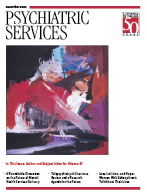Outcomes After Initial Receipt of Social Security Benefits Among Homeless Veterans With Mental Illness
Abstract
OBJECTIVE: This study examined the relationship between receiving disability payments and changes in health status, community adjustment, and subjective quality of life. METHODS: The study evaluated outcomes among homeless mentally ill veterans who applied for Social Security Disability Insurance or Supplemental Security Income through a special outreach program. Veterans who were awarded benefits were compared with those who were denied benefits; their sociodemographic characteristics, clinical status, and social adjustment were evaluated just before receiving the initial award decision and again three months later. RESULTS: Beneficiaries (N=50) did not differ from those were denied benefits (N=123) on any baseline sociodemographic or clinical characteristics. However, beneficiaries were more willing to delay gratification, as reflected in scores on a time preference measure. Three months after the initial decision, beneficiaries had significantly higher total incomes and reported a higher quality of life. They spent more on housing, food, clothing, transportation, and tobacco products but not on alcohol or illegal drugs. No differences were found between groups on standardized measures of psychiatric status or substance abuse. CONCLUSIONS: Receipt of disability payments is associated with improved subjective quality of life and is not associated with increased alcohol or drug use.



